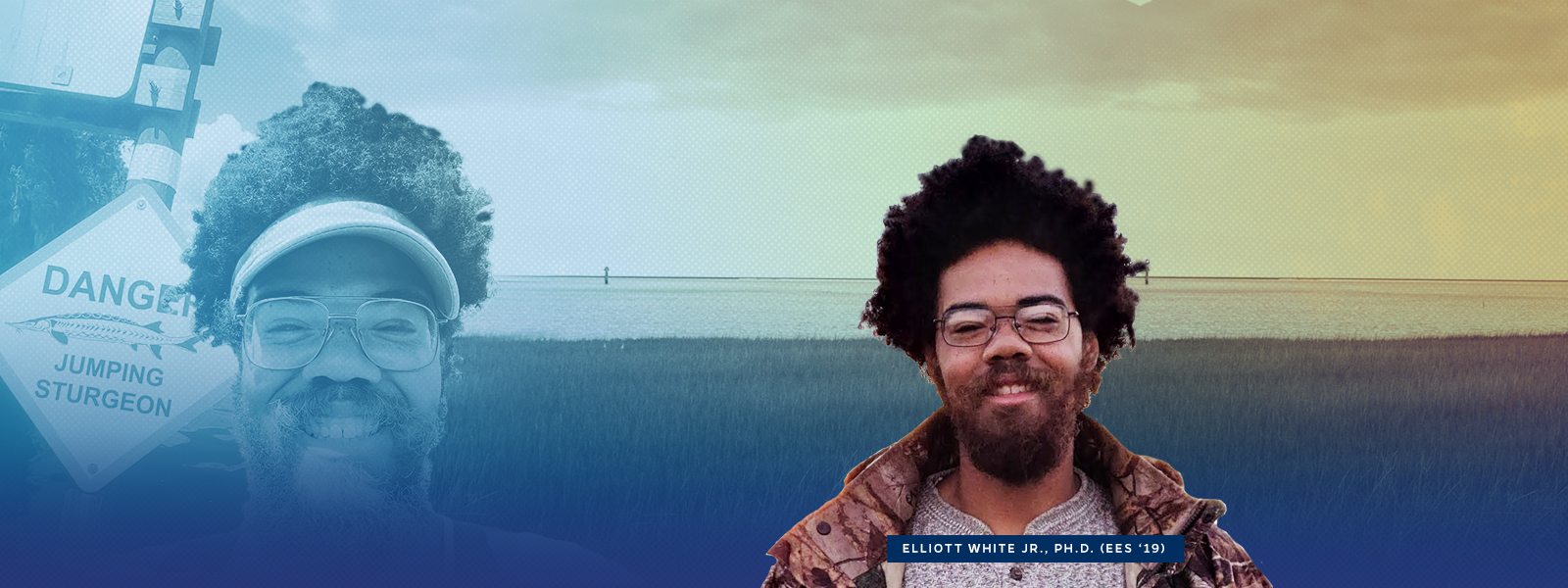Elliott White Jr., Ph.D., (Ph.D., EES ‘19) knows firsthand the powerful effects mentoring can have on student success, and he is determined to repeat it. Dr. White credits his mentor for being his biggest motivator, advocate and critic. Now, Dr. White has accepted a position as a tenure-track assistant professor at Stanford University and he plans to model the same type of mentorship to guide underrepresented students.
Dr. White was raised in a low-income neighborhood in New Orleans and forced to relocate due to Hurricane Katrina. Throughout his time in New Orleans, his parents put a strong emphasis on education as a means to success.
After he received his bachelor’s from Iowa State University, Dr. White came to the University of Florida (UF) to pursue a doctoral degree in environmental engineering sciences. He wanted to restore Louisiana coastal wetlands.
“I knew that UF had a storied history in advancing the field of wetland sciences. I felt that starting my career here would be a great benefit to my overall career trajectory,” Dr. White said. “I reached out to David Kaplan for an opportunity to do my doctoral research with him. Through phone calls and email exchanges, we realized our common interest and fit. Solidifying that relationship made my journey to UF possible.”
Dr. White recalls that the transition to his doctoral degree forced him to use his voice to seek guidance. But trying to balance classes, research and adulthood in his first semester put him on academic probation.
“I spent winter break distraught because I was sure David would fire me. We had an honest and reflective conversation at the start of the next semester. Over the course of talking, I realized that I was afraid to ask for help,” he said. “David reassured me that he took me on as a student because he believed in my ability to get a Ph.D. That conversation gave me a confidence boost that made this journey possible. To this day, I still sometimes struggle to ask for help because I have a very strong desire to do things on my own. However, I always reflect on how not asking for help has hurt me in the past and how reaching out helps me now.”
Dr. White credits Dr. David Kaplan, an associate professor in the Department of Environmental Engineering Sciences, for giving him full autonomy to grow in his research interests, providing a gentle hand of guidance when he felt unbounded, and being his biggest motivator, advocate and critic. Dr. White has modeled after Dr. Kaplan’s leadership style in his current position as a postdoctoral research associate at the University of Virgina.
“With mentoring, I feel I’m best when I act more as a cheerleader rather than a coach. My goal is to always help people find their career passions and then discuss ways to get on that path. I give them the room to explore while dropping in to give guidance when they might be lost or pass along opportunities that might interest them. Additionally, I think it is important to plug them into my professional network to increase their exposure and help them build a network for collaborations and career opportunities,” Dr. White added.
He uses ecology, hydrology, biogeochemistry and remote sensing to study the effects climate change induced sea-level rise and saltwater intrusion have on coastal wetland vegetation. This move to the Pacific Coast will expand his previous experience in the Gulf and Atlantic Coasts.
Dr. White sees this new faculty appointment as an opportunity to mentor underrepresented students.
“I recognize that there are not many Black professors and that the numbers for other underrepresented groups are not great either. A strong body of evidence points to the lack of mentors who are conscious to the challenges of being from an underrepresented group in STEM, exposure to explicit racial discrimination, and a lack of other underrepresented group role models to serve as inspiration. Overall, there needs to be a shift in how we recruit, train, and create spaces for these students, but it will take a long time to see systemic change. Taking on this hidden burden may have some impact on my scientific output, but I think it is more than worthwhile to ensure that we start creating ecosystems of diversity instead of pipelines,” Dr. White said.
Reba Liddy
Marketing & Communications Specialist
Herbert Wertheim College of Engineering
